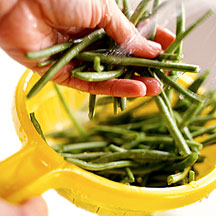Eating well to lose weight can have some hidden benefits. Here are some scale-friendly nutrition facts that could also help you ward off cancer.






Why? One reason may be that people who eat more of these foods are less likely to be obese, which is a risk factor for some forms of cancer.
While researchers are still searching for the answers, it appears that plant foods, particularly produce, are rich in antioxidants and phytochemicals. According to the National Cancer Institute, antioxidants work to stabilize free radicals, which are unstable molecules that damage cells and may cause cancer. However, more research needs to be done in this area—particularly when antioxidants are taken in the form of dietary supplements.
Nutritionists recommend getting most of your nutrients through food rather than supplements, and eating in moderation from a wide variety of food groups, particularly grains, fruits and vegetables. Be sure to get the five servings of fruits and vegetables per day that Weight Watchers recommends.
Anti-Cancer Eating Plan
The following are some of the dietary recommendations from the American Cancer Society for reducing your risk of cancer:
Nutritionists recommend getting most of your nutrients through food rather than supplements, and eating in moderation from a wide variety of food groups, particularly grains, fruits and vegetables. Be sure to get the five servings of fruits and vegetables per day that Weight Watchers recommends.
Anti-Cancer Eating Plan
The following are some of the dietary recommendations from the American Cancer Society for reducing your risk of cancer:
- Eat a variety of vegetables and fruits each day, and include vegetables and fruits at every meal and for snacks.
- Eat smaller portions of high-calorie foods. Be aware that "low-fat" or "nonfat" does not mean "low-calorie" and that low-fat cakes, cookies, and similar foods are often high in calories.
- When you eat away from home, choose foods low in calories, fat and sugar, and avoid large portion sizes.
- Choose 100% juice if you drink vegetable or fruit juices.
- Choose whole-grain rice, bread, pasta and cereals, and limit consumption of refined carbohydrates, including pastries, sweetened cereals and other high-sugar foods.
- Choose fish, poultry or beans as an alternative to beef, pork and lamb. When you do eat meat, select lean cuts and eat smaller portions.
- Prepare meat by baking, broiling or poaching, rather than by frying or charbroiling.
- Limit alcohol intake to no more than 2 drinks per day for men and 1 drink a day for women. (A drink is defined as 12 ounces of beer, 5 ounces of wine, or 1.5 ounces of 80-proof distilled spirits.)












0 feedbacks:
Post a Comment